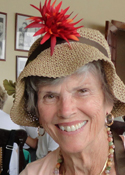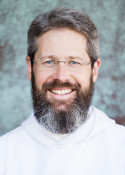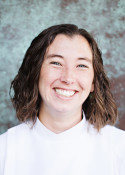FROM THE RECTOR
Their Little Roots
This past week I was afforded the opportunity to do something that I love—telling stories of Jesus using the methods of Godly Play. I told this story of Jesus at the Soup & Story that my family and I are a part of for the season of Lent, and the story that we entered into was the Parable of the Sower.
In the preparation to tell the story, but even more so in the telling of the story itself, I was taken by a phrase that is repeated in Jerome Berryman’s telling of the parable, “when the seeds tried to push their little roots down…” You see, in this parable every time the Sower scatters seeds, depending on the soil those seeds find, something different happens.
When the Sower scatters seeds on the path (the Sower scatters seeds even on the path), the parabolic birds come and gobble those seeds up. A hard-packed path is not an easy place for a plant to grow. And when the Sower scatters seeds on the rocky ground (the Sower scatters even on the rocky ground), we are told that, try as they might, those little roots, “could not push their way into the ground. When the Sun came out it scorched the seeds and they died.”
The little roots of those seeds could push part way in when the Sower scattered the seeds into the thorns (the Sower scatters even in the thorns), but the thorns choked them. They could not grow. Finally, when the Sower scattered the seeds in the good earth (that always makes more sense to me), “the seeds pushed their little roots down into the good earth, they could go all the way in. They grew and grew.”
It is the season of Lent, and every Lent we are invited to start anew, once again to grow towards God. So one of our principal tasks is to prepare ourselves, or in the words of my dad, to prepare the terrain. Those little roots of the seeds that the Sower scatters, they need good soil to spread out and push down. As Paul writes about in his letters, God will supply the growth, but it is our responsibility to prepare ourselves—our hearts and our minds, so that this new life can emerge.
There are times in our lives when our hearts are hardened, when we spring up quickly only to wither away, when we allow the cares of the world to choke what we are trying to grow. This is a truth that I know experientially and have seen borne out in the lives of those that I’ve guided over the years. And it is a truth that we are bearing in mind particularly now, in this season, as we prepare ourselves for the Mystery of Easter.
There are many, many ways to prepare ourselves for these seeds to take root. For some, it means turning over the soil, so that it is broken up, allowing for those little roots to push down before the birds of the air find them. For others, it is the practice of weeding, removing the plants that crowd out what we are trying to grow. Still others of us are pruning back nearby plants, in order to encourage growth in different directions. And for many, throughout out these forty days we are adding amendments to the soil so that there will be more nutrition for the seeds and then those plants to draw upon.
All of this—our stances and our practices, our words and our deeds—are offered so that those little roots of the seeds of the Sower have a chance. Or, to borrow some present-day phraseology,
Sower’s gonna sow.
It’s for us to prepare the soil.
Peace,
Phil+
From the Associate for Music
Old, New, and Everything in Between
 Even during this solemn season of Lent, I want to begin with a joyful greeting to the All Souls community! I write this on my fourth official day on the job, and will be very grateful for your patience and understanding as I continue to learn my way here. While you may have already heard something about me, what I most want to communicate at the outset is just how much I love church music; throughout my life, but especially during the more difficult stretches of my Ph.D. work, it is has filled me with meaning and purpose. But this love is much more than a response to the beauty or affective force of music. It is also fueled by the spiritual and social bonds that music enables and strengthens, by participating in and leading powerful communal thanksgivings and petitions. When we gather to worship and to sing, we construct a Christian and a human community—one that includes many who are not physically present—and glorify God as that collective. I’ve never felt a deeper calling than to explore the musical possibilities of this spiritual act.
Even during this solemn season of Lent, I want to begin with a joyful greeting to the All Souls community! I write this on my fourth official day on the job, and will be very grateful for your patience and understanding as I continue to learn my way here. While you may have already heard something about me, what I most want to communicate at the outset is just how much I love church music; throughout my life, but especially during the more difficult stretches of my Ph.D. work, it is has filled me with meaning and purpose. But this love is much more than a response to the beauty or affective force of music. It is also fueled by the spiritual and social bonds that music enables and strengthens, by participating in and leading powerful communal thanksgivings and petitions. When we gather to worship and to sing, we construct a Christian and a human community—one that includes many who are not physically present—and glorify God as that collective. I’ve never felt a deeper calling than to explore the musical possibilities of this spiritual act.
For those who don’t know, I’m currently a Ph.D. Candidate in Musicology at UC Berkeley. My academic work has involved considering how understandings of music and worship are highly contingent on time, place, and other factors. In other words, like many scholars in the humanities, I am committed to recognizing the essential dependence of human activity on context. The Episcopal Church’s canon on music takes this exact approach, requiring clergy and musicians to ensure that “music is appropriate to the context in which it is used.” At All Souls, that directive has translated into a rich variety of musical offerings: the ultimate goal is not merely to reflect the diversity of our community but to live out the belief that God can be found in and through many sorts of music, played with many sorts of instruments, sung by many sorts of people. I grew up in the Episcopal Church, and have firm roots in what is often called the “English choral tradition,” with its boys’ choirs, gothic cathedrals, and treasured compositions stretching back many centuries. This all forms an important piece of the heritage of All Souls, and as such I feel like I am coming home again. But the Church has been—and we all are—at our best when we don’t follow tradition slavishly or in a necessarily linear fashion; this might mean embracing the novel or the unfamiliar, or it might mean recovering from the early Church something that seems to have been lost in later ages. Accordingly, I have for a number of years been discovering the true breadth of Christian music-making, while remaining focused on its core purposes. Going forward, I hope to create an environment in which as many of you will contribute musically as feel comfortable and inspired. I hope it will be affirming, with a focus on how at any given moment we can use any text or any tune to worship with conviction. Please email me at jamie@allsoulsparish.org to express your interests, desires, and concerns!
– Jamie Apgar
From the Associate Rector
We Will, with God’s Help… but how?
This is about “getting out of the pages of this book,” Nikky said. “These are living questions – questions to live by.” I was inquiring about the adult formation class, We Will, with God’s Help: Living into Our Baptism, that Nikky Wood is leading together with the Rev. Dr. Ruth Meyers, and she caught my attention. The class meets at 10:10 am the next four Sundays in the Parish Hall. Perhaps better described as a guided discussion than a class, here is a glimpse of why Ruth and Nikky are leading it, and why we would all do well to take part.
+++
Liz: What is it about baptism in particular that has so fully caught your attention? Is there a moment or an image that inspired this class?
Nikky: It’s such a powerful sacrament, the fullness of the symbol of water in our lives. Twice now, with two kids, Adam and I have sat down and wrestled with why we do this. We ask what these promises are, what it means for our children and for us, and how we parent. It makes us ask what we teach them about the church and the world.
But the moment? Most recently, it was at Malcolm’s baptism with the All Souls community, I was feeling like these are really huge things to do. But what caught my attention was that this really overwhelming feeling was coupled with the support of the community of faith. Adam and I don’t have to fulfill these promises by ourselves. We are speaking them for our son, but we do not have to keep the promises alone. This class emerges from a desire to engage deeper with the community that promises these things for each other, and for each other’s children. This is time to think about how we actually do that.
Liz: What are the gnashing questions for you around baptism?
Nikky: There are two questions that I really wrestle with in the Baptismal Covenant. First, “Will you seek and serve Christ in all persons, loving your neighbor as yourself?” This question feels particularly challenging and confusing in Berkeley – walking around, wondering how to embody that commitment, and the balance of loving the neighbor without a home on the street while keeping my kid safe. I struggle with how to engage people asking for money or other things, as I pass by with my young children.
The second one I struggle with is, “Will you proclaim by word and example the Good News of God in Christ?” I think about how I’m supposed to be an example of this Good News all the time: when I’m frustrated, when I’m trying to discipline my child, and when I’m tired. All the time, what we model is what the kids learn from us, including our faith. “What does it mean that my mom believes in God in Christ when she’s angry?” I wonder about how we live out this example.
The other parts of the Baptismal Covenant feel more straightforward. It’s easier for me to promise that I will continue praying, continue in fellowship; I know I will fall down, so I can promise to repent and come back – but to be an example in this world – that is challenging.
Liz: Why are we engaging these questions in this season of Lent?
Nikky: This a way to get ready for Easter, when we are going to make these promises again. We will be baptizing some of the sweet new babies of this parish, and in the middle of it all, we will be asked if we who witness these vows will do all in our power to support them in their life in Christ. What do we mean by that? How will we live that out? This is not a class to teach you about the meaning of baptism, but instead a time to wrestle with the vows we have made, and will keep making.
+++
I don’t know about you, friends, but these are questions that I wrestle with too. Time and again I hear from adults who aren’t quite sure how to hold and respond to their kids’ perplexing questions about faith and the world. This is a time to engage those, together. Now more than ever, I hear adults of every age grappling with what it means to be a faithful Christian at this time and with this administration. This class is a space to explore these questions of identity and faithful action in the world. And in a time where it seems that most everything can be bought and sold, this is a space to reclaim some of the sacred mystery and wonder that does, in fact, pervade our world. So come, this Sunday at 10:10 am – with your questions, your convictions, your doubt, your faith. We’re in this wild ride together, and God surely knows we need to reflect on the way forward – together.
Peace,
Liz+
A Conversation Begins (and None too Soon)
 More than a year ago, I said to my friend of more than 50 years, Gloria Bayne, “In all of our years of remaining close friends, we have never really talked about our early lives, growing up in very different circumstances including the one that found one of us, white and the other, black.
More than a year ago, I said to my friend of more than 50 years, Gloria Bayne, “In all of our years of remaining close friends, we have never really talked about our early lives, growing up in very different circumstances including the one that found one of us, white and the other, black.
We started by listing side by side all the things we had in common as we were growing up, from our places of birth, hers in Texas and mine in Indiana, until we had met in 1963. It was quite amazing… clearly, enough to bring us together.
Little did we realize that a year later we would be in the midst of an era when we would understand how important conversations such as ours would become.
It appears to be popular, these days to say, “We are more divided in this country today than ever in our past.” Putting aside the fact that that those thirteen colonies had little more in common than their dislike for British rule and the desire to be free of it, there are today some terribly serious crises in this country, but I am convinced this “deep division” stems largely from our lack of understanding of each other.
Living in this bubble here on the West Coast as we do, It is easy to blame the other guy for all of our problems. But do we have any idea of what is going through the minds of those in the “fly over zone” between us and the East Coast sophisticates? While we can learn much from books like Isabel Willkerson’s The Warmth of Other Suns, about the Great Migration, or Arlie Hochschild’s Strangers in Their Own Land, about her journey to Louisiana and her visits with the arch conservative bayou country people, we can truly start our own journeys by listening to the stories of others closer to us. Even our very best friends.
We hope to share some of the real “aha!” moments experienced as we delved more deeply into our separate worlds with the invaluable help of a couple of important players in Gloria’s world. Our “Conversation,” will take place on Sunday, March 19th after the 11:15 am service.
Please join a couple of your elders (and maybe some visiting voices) for an hour of chatter, which we hope will leave you all with smiles on your faces.
Of course, we hope to offer you some goodies that should keep up your great good spirits! If you need childcare in order to attend, please tell Liz Tichenor by this Sunday.
– Margaret Sparks
Daylight Saving Time!
Don’t forget to change your clocks this Saturday night… or you might arrive only in time for the final blessing on Sunday!
HIGH SCHOOL LOCK-IN
CAMP ALL SOULS: CALLED TO JUSTICE!
Have you heard? Day Camp is happening right here at All Souls this summer, for ages 5-11, August 7th – 11th! It will be a time to build community, to practice justice, to come close to God, and to have a blast. You can learn more and register online here or pickup forms in the narthex. Teenage and adult volunteers are most welcome to join the fun too! Talk to Liz for more information.





